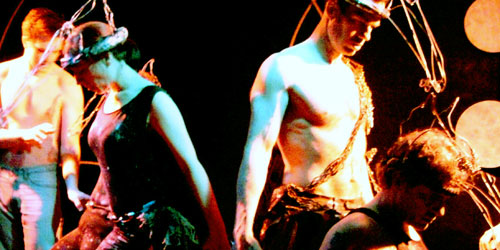By Michael H. Margolin

"Equus" continues at the Blackbird Theatre through March 19. Photo: Blackbird Theatre
One of the highlights of many seasons occurred last night, the opening night of Peter Shaffer's compassionate and challenging "Equus" at the tiny Blackbird Theatre in Ann Arbor.
Making her directorial debut, Sarah Lucas is tested by fire: a play containing actors in multiple roles, actors imitating horses, total male nudity and the pathology of a lead character who blinds six helpless animals. Yet she keeps the universal and the specific themes locked together in a beautiful dance of drama, serving the playwright's intentions.
In the 1970s, English, Jewish playwright Peter Shaffer read a news story about a young boy of 17 who blinded six horses. "Equus" is his imagining the source of the conflict, the distortion of reason, the passion that could lead to such an act – and also challenging the hegemony of Freudian therapy, just then coming under attack from many directions.
These are the specifics of the play, the plot on which hangs the universal ideas that Shaffer enacts through his characters: Seventeen-year-old Alan Strang (Evan Mann) is sentenced for the blinding of six horses; the magistrate asks psychiatrist Martin Dysart (Lee Stille) to take him into the mental hospital, treat him, rather than sentence him to prison: "He is in pain," she tells him. And Dysart treats children successfully in his career.
Strang's mother is a former schoolteacher who inculcates him into the rituals and adoration of Christianity while his father is a rigid, uptight man, a non-believer. The incident which fuels the plot is when 6-year-old Alan encounters a horse on the beach, is given a ride and falls into obsessional love, which, later, becomes erotic, tangled with Christian morbidity.
Lucas directs the scenes with uncommon feeling for the imaginary: The first time we see the horse, it is through Alan's eyes, as he rides, strokes an imaginary beast.
The horse's owner (Sean Sabo) later becomes a horse, and Lucas along with movement/choreographer Jennifer Graham devise an effective vocabulary of physical movement that creates both a realization of the horse and a reflection of the inchoate eroticism that binds Alan to him.
The action takes place on a one-set stage, aptly designed by Barton Bund who also created the wonderful horse head masks worn by the actors; the horse masks, of wire, reflect Dysart's dream in which he is an ancient Greek, wearing a mask and killing children.
The irony of a doctor killing children in dreams and treating them in life leads Dysart to question his career: By making children "better," does he send them out to become mindless cogs in a societal machine, he wonders? – though Shaffer's language is far more eloquent. Dysart's struggle calls to mind Socrates' words which have lived on for 15 centuries: "The unexamined life is not worth living."
In this extraordinary production, all the actors play two roles (second characters and/or horses) but for the protagonists, Dysart and Strang. Sabo creates an unforgettable character as the horse, Nuggett. Wearing a mask, naked to the waist, his lean, hairy torso is the human equivalent of animal beauty. When Alan strokes Sabo's chest, the sensuality is palpable. Sabo has the attributes of a sculpture made animate: snorting, stomping, in every way a horse/human.
Each and every performance can and should be singled out. Brenda Lane is pitch perfect as the magistrate and as the psychiatrist's confidant. (As we know from the fine HBO series "In Treatment," therapists need their own.)
As Dora Strang, the hapless mother, Amy Griffith is a nattering, secretive woman who uses her son against her husband. But when she explodes in anger at her son, then the doctor, she is immensely touching, her raw feelings causing us to feel sympathy.
In the dual role of Frank Strang and the stable owner who gives Alan his job tending horses, Tom Foley gives us wary, restrained character, then an exuberant one.
The prim hospital nurse, played by Alysia Kolascz, is a minor character, but when she shows up as Jill Mason, the playful, seductive teen who prompts Alan's neurotic conflict into action, she is extraordinarily good.
This leads us to Alan and Dysart. The lean Evan Mann is handsome, but not pretty: He has a noble brow right for Shakespeare or the rugged/soft look of a Tennessee Williams hero. At one point, sitting in the front row, just a few feet from the action, Mann, with his back to us, is in conflict about whether to reveal something to "Nosy Parker" Dysart. Mann's irresolution could be seen in his neck and shoulders as plainly as if one were watching his face. He is, in turn, sarcastic, secretive, frightened, defensive, embittered and, finally, self-aware as insight floods over him. It is a mature and completely imagined performance.
In the role of the troubled psychiatrist who looks back on his arid, childless marriage, lost in Appolonian dreams of ancient Greece, Lee Stille fills the stage with big emotions and queries about his life's work and how society may use him to quell great dreams in troubled people. Stille gives a nuanced, admirable performance.
Shaffer does not let Dysart off easy, for at the end, he sees himself with a bit in his mouth, like the horse, like the martyr, like a slave to psychiatry.
In the tight quarters at the Blackbird, there is nowhere to hide as an actor – as in the final scenes when Mann is totally naked and Kolascz is nearly so, or when actors, in unison, go from sitting quietly on stage to donning horses masks and accoutrement. This forced intimacy becomes, then, a subtext of the play that each audience member must deal with in their own way. Caveat emptor.
REVIEW:
'Equus'
Blackbird Theatre, 325 Braun Ct., Ann Arbor. Thursday-Sunday through March 19. $25. 734-332 3848. http://www.blackbirdtheatre.org










